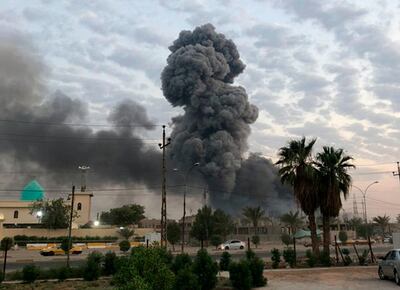Several explosions over the past month at sites belonging to Tehran’s main militia allies in Iraq have been met by deafening silence from the Baghdad government.
The explosions, at munition depots and other facilities belonging to the Popular Mobilisation Forces (PMF), an umbrella group of militias many of which are aligned to Iran, have thrown the group into disarray, and with it the Iraqi government.
No one claimed responsibility for the incidents. But the most fervent allies of Iran in the PMF said the attacks came from the air, with a spokesman calling on the government to ban US military activity in the country.
On Wednesday Abu Mahdi Al Muhandis, the main commander among Iranian proxies dominant in the PMF, blamed the US and Israel. The government-backed head of the PMF Faleh Al Fayyadh distanced himself from that explanation however.
Many of the militias comprising the PMF were formed to fight ISIS or act as the infantry component in the Iranian drive to support the government of Bashar Al Assad in Syria.
PMF factions are also known for their mishandling of munitions, especially in the summer months. Depots belonging to the militias have exploded in the past due to extremely hot temperatures and careless storage.
In the most devastating explosion last June, at least 20 people were killed by exploding munitions stored in a mosque in Sadr city, a Baghdad slum. No one was held accountable.
The government has struggled to contain the mostly Shiite militias and live up to its commitments to the US to keep them neutral in the confrontation between Washington and Tehran.
One PMF ammunition dump exploded this week in Balad, north of Baghdad. Previously, an Iraqi gunman was killed and two Iranians were wounded in what the PMF said was a fire caused by a technical error at a base in the central Amerli region. Last week blasts went off at a military camp south of Baghdad.
One Iraqi politician suggested that at least some of the blasts may have been portrayed as external attacks to avoid raising resentment against the militias for the careless way they store munitions.
“Israel does not hesitate to strike when its national security is at stake, but the contradictory Hashd statements suggest there could be something else to the explosions,” the politician said, using the abbreviated Arabic name for the PMF.
Izat Al Shabandar, one few Iraqi politicians who criticises the PMF publicly, said a lack of any coherent response by the group shows that it only knows how to scare off its domestic critics.
Iraqi Prime Minister Adel Abdel Mahdi said his approval is now required for any operations in Iraqi air space. He has made similar pronouncements in the past, banning military action by non-state actors, only for violence, including attacks on US targets, to continue unabated.
The US has ruled the skies over Iraq since the 1991 Gulf War and any aerial attack would likely not have occurred without its knowledge. If air attacks against the PMF were confirmed, it would signal an escalation in the confrontation with Iran that will likely only further expose the haplessness of the Baghdad government.
At the same time, it is convenient for the militias to blame the US for their own operational blunders.



